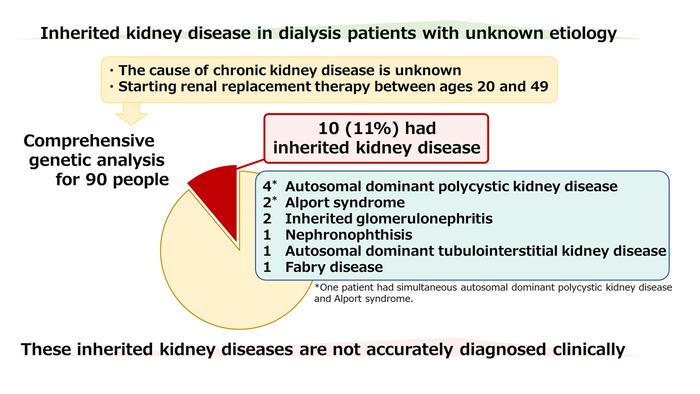Tokyo Medical and Dental University (TMDU) researchers discover that known genetic variants might account for a large portion of chronic kidney diseases of unclear origin

Credit: Department of Nephrology, TMDU
Tokyo Medical and Dental University (TMDU) researchers discover that known genetic variants might account for a large portion of chronic kidney diseases of unclear origin
Tokyo, Japan – Chronic kidney disease (CKD) is extremely prevalent among adults, affecting over 800 million individuals worldwide. Many of these patients eventually require therapy to supplement or replace kidney functions, such as dialysis or kidney transplant. While most CKD cases originate from lifestyle-related factors or diseases such as diabetes and hypertension, the underlying causes of CKD remain unknown for about one in every ten people with end-stage renal failure. Could CKD in these patients stem from latent, undiagnosed genetic conditions?
In a recent study published online on 14 February 2024 in Kidney International Reports, researchers from Tokyo Medical and Dental University (TMDU) in Japan set out to answer this question through a comprehensive genetic analysis of CKD patients.
First, the researchers acquired data from 1,164 patients who underwent dialysis in four different clinics in the Kanagawa Prefecture during November 2019. From this multicenter cohort, the researchers filtered out adults who were over 50 years old, since people at that age have a lower incidence of inherited kidney diseases. They then filtered out patients who had an apparent cause for their CKD, leaving 90 adults with CKD of unknown origin who had consented to genetic testing.
“We conducted a comprehensive analysis of 298 genes responsible for various inherited renal diseases using next-generation sequencing,” explains lead author Dr. Takuya Fujimaru. “These included polycystic kidney disease, nephronophthisis-related ciliopathies, autosomal dominant tubulointerstitial kidney disease, focal segmental glomerulosclerosis, Alport syndrome, and atypical hemolytic uremic syndrome.”
The results revealed that 10 of the 90 patients (11% of the final cohort) had pathogenic variants in CKD-causing genes. Importantly, for these patients, the clinical diagnosis at the time of dialysis was incorrect. What was particularly noteworthy was that some of the hereditary renal diseases contemplated in this study, such as Fabry’s disease and Alport syndrome, could be diagnosed and treated early on to slow down or halt the progression of CKD.
On top of these findings, the researchers determined that 17 patients (18.9%) had genetic variants of unknown significance (VUS) with a high probability of pathological involvement. While the relationship between these variants and kidney diseases is not clear, they should not be ignored or taken lightly. “Although the interpretation of these VUS is currently unknown, some of them may indeed be responsible for CKD,” remarks senior author Dr. Takayasu Mori. “Thus, true hereditary kidney diseases may underlie many more cases than anticipated.”
This study marks one of the world’s largest comprehensive genetic analysis of patients with end-stage renal failure using clinical data. As such, the conclusions derived from the results can have important implications in how CKD is diagnosed and managed in adults. “When the primary disease underlying a case of CKD is unknown, genetic analysis could lead to accurate diagnosis and appropriate treatment before the disease progresses, which could hopefully result in a decrease in the number of patients requiring dialysis,” highlights senior author Dr. Eisei Sohara. “Thus, proactive genetic analysis is recommended for adult patients without a definitive cause of CKD.”
Notably, this research group has been conducting genetic analyses of hereditary kidney diseases since 2014, reaching over 1,500 families. They have recently filed a patent for a new genetic analysis system for Japanese individuals, which would assist in correctly diagnosing cases of CKD. With any luck, further efforts will pave the way to a brighter future for people with inherited kidney diseases.
###
The article, “Genetic diagnosis of adult hemodialysis patients with unknown etiology,” was published in Kidney International Reports at DOI: 10.1016/j.ekir.2024.01.027
Journal
Kidney International Reports
DOI
10.1016/j.ekir.2024.01.027
Article Title
Genetic Diagnosis of Adult Hemodialysis Patients With Unknown Etiology




